
The United Nations Organization Stabilization Mission in the Democratic Republic of the Congo, or MONUSCO, is a United Nations peacekeeping force in the Democratic Republic of the Congo (DRC). A planned withdrawal from the country is currently on indefinite hold due to the unstable security situation.

The United Nations Operation in the Congo was a United Nations peacekeeping force which was deployed in the Republic of the Congo in 1960 in response to the Congo Crisis. The ONUC was the UN's first peacekeeping mission with significant military capability, and remains one of the largest UN operations in size and scope.
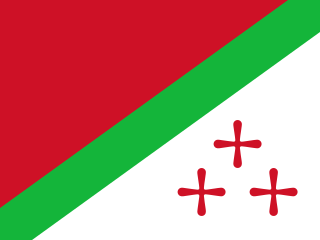
The State of Katanga, also known as the Republic of Katanga, was a breakaway state that proclaimed its independence from Congo-Léopoldville on 11 July 1960 under Moïse Tshombe, leader of the local Confédération des associations tribales du Katanga (CONAKAT) political party. The new Katangese state did not enjoy full support throughout the province and was constantly plagued by ethnic strife in its northernmost region. It was dissolved in 1963 following an invasion by United Nations Operation in the Congo (ONUC) forces, and reintegrated with the rest of the country as Katanga Province.
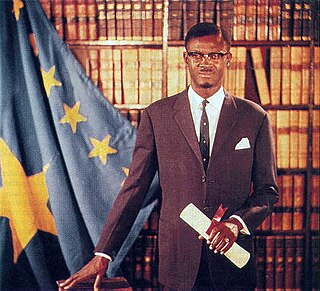
United Nations Security Council Resolution 161 was adopted on February 21, 1961. After noting the killings of Patrice Lumumba, Maurice Mpolo and Joseph Okito and a report of the Secretary-General's Special Representative, the Council urged the United Nations to immediately take measures to prevent the occurrence of civil war in the Congo, even if the use of force is necessary. The Council further urged the withdrawal of all Belgian and other foreign military, paramilitary personnel and mercenaries not with the UN and called upon all states to take measures to deny transport and other facilities to such personnel moving into the Congo. The Council also decided that it would launch an investigation into the death of Lumumba and his colleagues promising punishment to the perpetrators.
United Nations Security Council Resolution 169, adopted on November 24, 1961, deprecated the secessionist activities in Katanga as well as armed action against United Nations forces and insisted that those activities cease. The council then authorized the Secretary-General to take whatever action necessary to immediately apprehend and deport all foreign military personnel, paramilitary personnel and mercenaries not with the UN and requested that the SG take all necessary measures to prevent their return. The Council then asked all member states to aid the Government of the Republic of the Congo and to prevent any actions which might contribute to the conflict there.
United Nations Security Council Resolution 226 was adopted unanimously by the United Nations Security Council on October 14, 1966. The Council urged the government of Portugal to prevent foreign mercenaries in the Portuguese territory of Angola from interfering in the domestic affairs of the Democratic Republic of the Congo (DRC).

United Nations Security Council Resolution 239, adopted unanimously on July 10, 1967, after reaffirming its concern over the issue and past condemnations, the Council again condemned any state which persisted in permitting or tolerating the recruitment of mercenaries or the provision of facilities to them, with the objective of overthrowing the governments of member states. The Council called upon governments to ensure that their territory and nationals were not being used for the planning of subversion, the recruitment, training or transit of mercenaries designed to overthrow the government of the Democratic Republic of the Congo.

United Nations Security Council Resolution 1906, adopted unanimously on December 23, 2009, after reaffirming previous resolutions on the topic and noting the situation in the Democratic Republic of the Congo, the Council decided to extend the mandate of the United Nations Mission in the Democratic Republic of Congo (MONUC) until 31 May 2010. The resolution therefore allowed 21,000 police and domestic and international troops to remain the country.
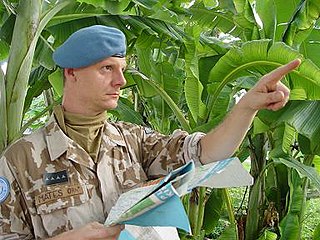
United Nations Security Council resolution 1355, adopted unanimously on 15 June 2001, after recalling resolutions 1234 (1999), 1258 (1999), 1265 (1999), 1273 (1999), 1279 (1999), 1291 (2000), 1296 (2000), 1304 (2000), 1323 (2000), 1332 (2000) and 1341 (2001) on situation in the Democratic Republic of the Congo, the Council extended the mandate of the United Nations Mission in the Democratic Republic of Congo (MONUC) until 15 June 2002 subject to review every four months.
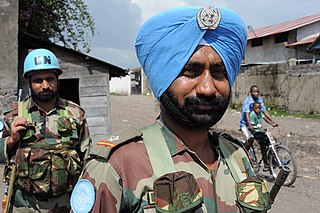
United Nations Security Council resolution 1445 was adopted unanimously on 4 December 2002. After recalling all previous resolutions on situation in the Democratic Republic of the Congo, the council expanded the military component of the United Nations Mission in the Democratic Republic of Congo (MONUC) to a level of 8,700 military personnel–up from 4,250–in two task forces.

United Nations Security Council resolution 1493, adopted unanimously on 28 July 2003, after recalling all resolutions on the situation in the Democratic Republic of the Congo, the council extended the mandate of the United Nations Mission in the Democratic Republic of Congo (MONUC) until 30 July 2004 and raised its troop level from 8,700 to 10,800.

United Nations Security Council resolution 1533, adopted unanimously on 12 March 2004, after recalling all previous resolutions on the situation in the Democratic Republic of the Congo, the council established a committee to monitor an arms embargo imposed on all foreign and Congolese forces in the east of the country.

United Nations Security Council Resolution 1592, adopted unanimously on 30 March 2005, after recalling all previous resolutions on the situation in the Democratic Republic of the Congo, including Resolution 1565 (2004), the Council extended the mandate of the United Nations Mission in the Democratic Republic of Congo (MONUC) until 1 October 2005.
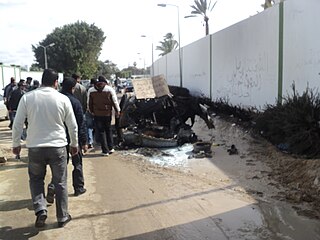
United Nations Security Council Resolution 1970 was a measure adopted unanimously by the UN Security Council on 26 February 2011. It condemned the use of lethal force by the government of Muammar Gaddafi against protesters participating in the Libyan Civil War, and imposed a series of international sanctions in response.

Resolution 1973 was adopted by the United Nations Security Council on 17 March 2011 in response to the First Libyan Civil War. The resolution formed the legal basis for military intervention in the Libyan Civil War, demanding "an immediate ceasefire" and authorizing the international community to establish a no-fly zone and to use all means necessary short of foreign occupation to protect civilians.

United Nations Security Council Resolution 1643, adopted unanimously on 15 December 2005, after recalling previous resolutions on the situation in Côte d'Ivoire, the Council extended an arms embargo and travel and financial restrictions against the country until 15 December 2006, and included a ban on the trade of diamonds.

Operation Grandslam was an offensive undertaken by United Nations peacekeeping forces from 28 December 1962 to 15 January 1963 against the forces of the State of Katanga, a secessionist state rebelling against the Republic of the Congo in Central Africa. The Katangese forces were decisively defeated and Katanga was forcibly reintegrated into the Congo.
Operation Rum Punch or Operation Rampunch was a military action undertaken by United Nations peacekeeping forces on 28 August 1961 against the military of the State of Katanga, a secessionist state from the Republic of the Congo in central Africa. UN troops arrested 79 foreign mercenaries and officers employed by Katanga with little conflict.
The Battle of Kabalo was fought at Kabalo by United Nations peacekeeping forces and Baluba militias from 7 April to 11 April 1961 against mercenaries and the gendarmerie of the State of Katanga, a secessionist state rebelling against the Republic of the Congo in central Africa. The Katangese forces attacked the town as part of a larger offensive meant to restore their authority in northern Katanga which was challenged by the Baluba. A United Nations Operation in the Congo peacekeeping contingent garrisoning Kabalo, acting under the authority of their mandate to prevent civil war in the country, resisted the initial attack and arrested 30 mercenaries in Katanga's employ. Armed Baluba repelled a Katangese ferry carrying troops as well as an armoured train. The next day the ferry returned but was sunk by UN forces. Fighting continued over the next few days between the Baluba and Katangese until the latter withdrew. The battle led to a deterioration of relations between the Katangese government and the United Nations Operation in the Congo.

The Katangese Gendarmerie, officially the Katangese Armed Forces, was the paramilitary force of the unrecognized State of Katanga in Central Africa from 1960 to 1963. The forces were formed upon the secession of Katanga from the Republic of the Congo with help from Belgian soldiers and former officers of the Force Publique. Belgian troops also provided much of the early training for the Gendarmerie, which was mainly composed of Katangese but largely led by Belgians and later European mercenaries.















